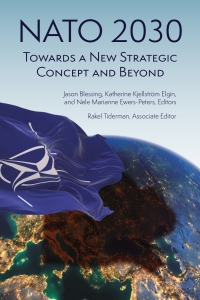My main research areas are at the intersection of European security, global governance and security cooperation among international organisations with a special interest in the EU-NATO relationship. In my research, I focus on interactions between member states and between the institutions themselves. I am also interested in the EU’s external relations with the African Union (AU), Organisation for Security and Coooperation (OSCE) in Europe and key states such as Russia and the United States. For the conduct of my research I have received funding from the University of Kent, ANTERO Jean Monnet Network and the Germany Academic Exchange Service (DAAD).
‘Towards the Construction of a (New) European Security Architecture? Perceptions and Perspectives by Germany, Russia and the US’ (proposed title)
This research project is co-funded by the German Academic Exchange Service (DAAD).
In this project, I work on the conceptualisation of a (new) European security architecture through which I seek to examine the triangular relations and interactions between Germany, Russia and the US. It also considers these states’ embeddedness in Europe’s most important security organisations – the EU, NATO and OSCE.. With the changing international liberal world order, new tensions between Russia and the Euro-Atlantic community, three countries receive particular attention – Germany, Russia and the US – due to their roles in world politics, in the respective security organisations in Europe and their historical and political ties. Theoretically, I apply insights from triangular relationships and network theory to theorise the triangular relations and to conceptualise the contemporary European security architecture.
Edited volume with Jason Blessing and Katherine Kjellström Elgin, and Rakel Tiderman as associate editor, at the Johns Hopkins School of Advanced International Studies (SAIS). This project is co-funded by the German Academic Exchange Service (DAAD) and the German Ministry of Foreign Affairs.

In this edited volume, we approach the question ‘To what extent can NATO maximise its relevance for the future?’ by taking a forward-looking perspective. This edited volume seeks to illuminate the challenges and opportunities facing NATO in 2030 and beyond. It will be a future-oriented collection of chapters that provides fresh insights into the pressing issues and debates surrounding the alliance. To this end, we seek to bring together a new generation of scholars to dialogue with more established voices across the United States and Europe on NATO. This book will serve as a key reference and valuable roadmap for American and European policymakers as they consider they alliance’s next stage of transformation.
Further information can be found here.
‘Understanding EU-NATO Cooperation: How Member States Matter’ (Routledge, 2022)
For the conduct of my doctoral studies I received funding from the University of Kent 50th Anniversary Scholarship and the ANTERO Jean Monnet Network.

This book examines the development of cooperation between the EU and NATO, two key non-state actors in the European security architecture.
The work examines the relationship between the EU and NATO by focusing on the perspective of member states. Highlighting the relevance of member states’ role in shaping EU-NATO relations, it conceptualises interorganisational cooperation and develops a typology of member states based on four types: advocates, blockers, balancers and neutrals. To apply this typology and analyse member states’ specific roles, the analysis considers their foreign and security policy orientations, bilateral relationships with other member states, and contributions to both military operations, and division of labour between the two organisations. The book also examines states’ use of political strategies — such as forum-shopping, hostage-taking and brokering — that influence the design, evolution and practicalities of cooperation between the EU and NATO.
This book will be of much interest to students of European Security and Defence Policy, international organisations, and security studies in general.